Anyway, that is perhaps too much detail for the ardent CC Denialist to compute, as are most likely these illustrations (about the "science" of global warming):
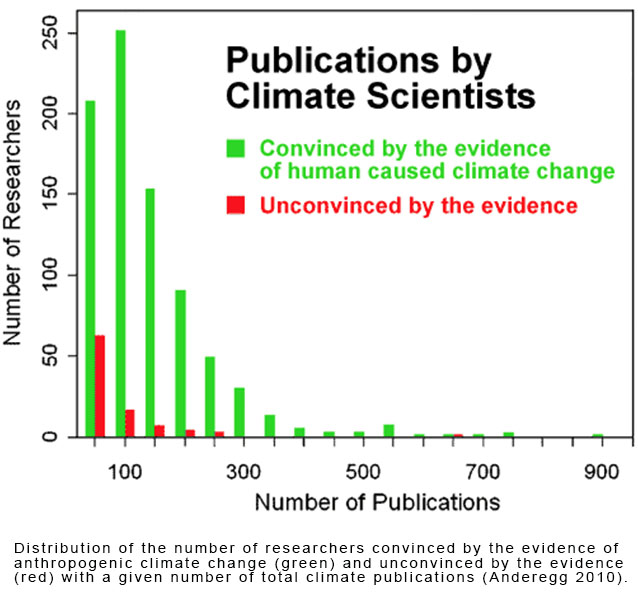
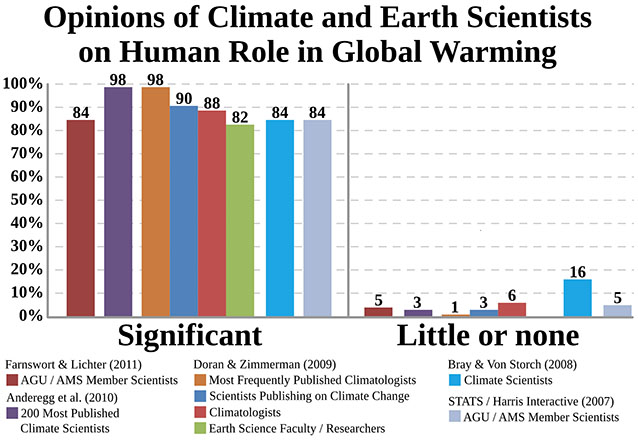
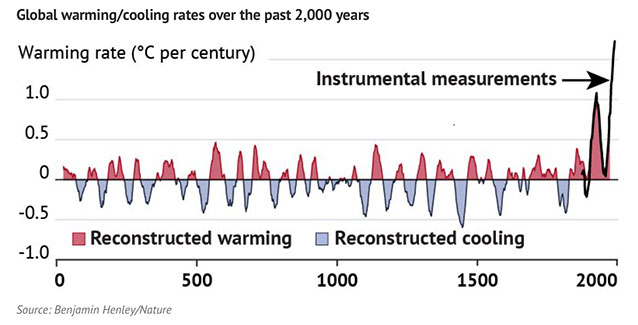
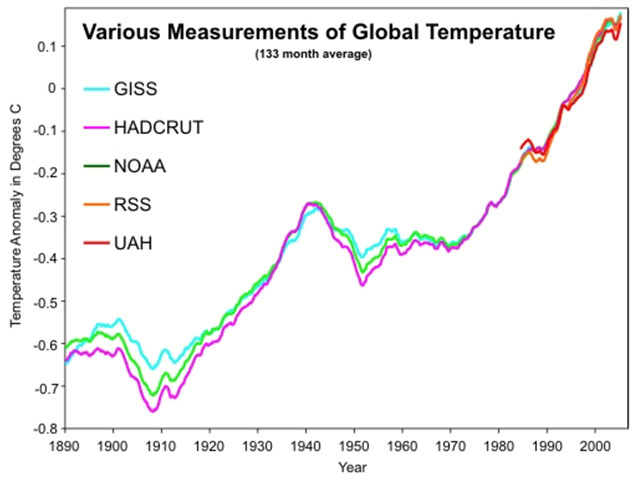
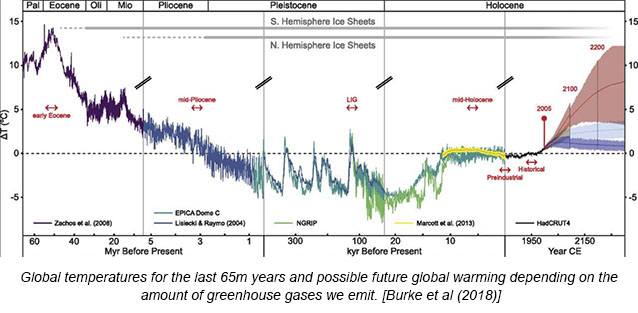
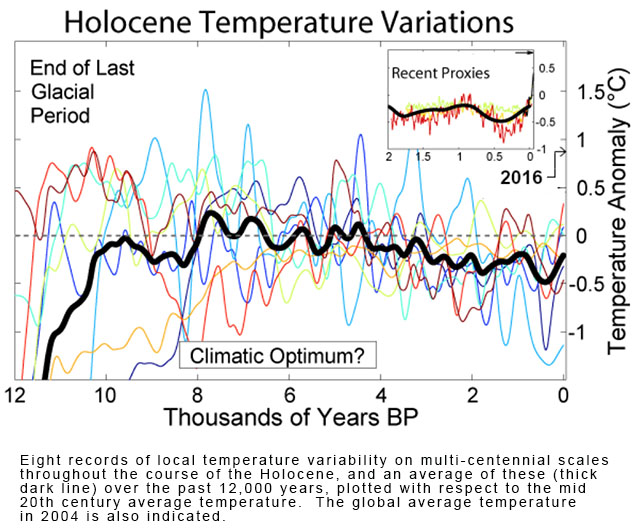
There is something interesting to observe about the last chart, the Holocene Temperature Variations. The fat line denotes the long term trend of average global temperatures ... and it can clearly be seen that the trend is downwards. This means nothing less than that 'naturally' the world is cooling, indeed heading for another (probably 'mini') ice age. Naturally the world is not warming, the warming is unexpected, unusual ... and man-made.
One last thing:
In the email it says, "... fight the disgraceful and highly exaggerated “climate change” propaganda campaign."Well, this is such an odd statement in view of the facts that are accepted by 97% of climate scientists ... the statement alludes to a severe disconnect with reality. The stance is un-educated, ignorant in the extreme, delusional and truly dangerous; just ask the Pacific Islanders ...
... or ask Ian Dunlop, who says: "Today, in the face of rapidly accelerating climate impacts, “existential threat” and “climate emergency” are common currency globally ... existential meaning the potential to destroy humanity as we know it."
So, who on Earth is Ian Dunlop? A Leftie-Greenie CC warrior? Well, Ian Dunlop is a former oil, gas and coal industry executive. He was chairman of the Australian Coal Association and CEO of the Australian Institute of Company Directors. He is co-author of the report What Lies Beneath: the understatement of existential climate risk, published by the Breakthrough Centre for Climate Restoration, and a member of the Club of Rome’s Climate Emergency Plan. See my blog 962.
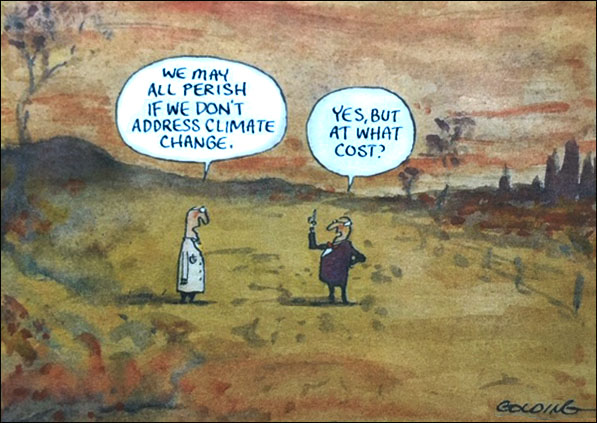
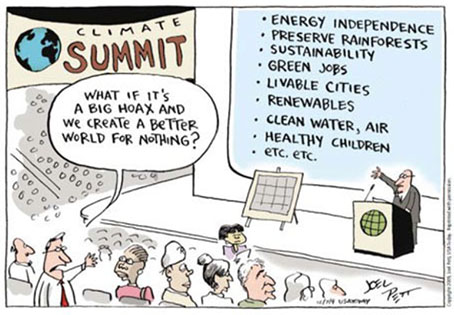
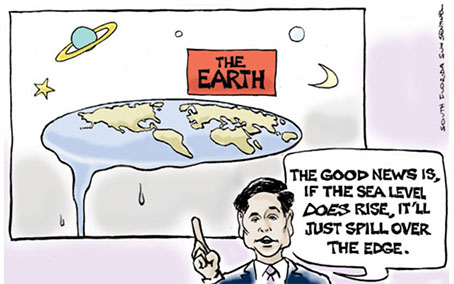
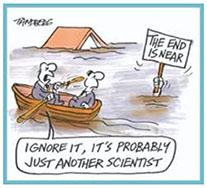
I give the last word to David Attenborough ... take it away, Sir David (but then - as the author of the emails would say - what does he know?!):
Civilisation may 'collapse' if climate change ignored: Attenborough
Katowice, Poland:
Famed naturalist Sir David Attenborough says human civilisation may collapse unless the world takes action to curb climate change.
The British TV presenter of nature documentaries told leaders gathered for a UN climate summit that "right now, we are facing a man-made disaster of global scale, our greatest threat in thousands of years."
The 92-year-old added that "if we don't take action, the collapse of our civilisations and the extinction of much of the natural world is on the horizon."
If I haven't bamboozled you too much and you can handle some more reading ... go to my blogs 941, 942 about The Great Filter, and 943 about The Fourth Filter (careful, though ... your perception of reality may be shaken). And if that's still not enough, in this context read the story about The Great Filter.
____________________________
Human-caused global heating breaks clear from nature,
studies find - SMH
by Peter Hannam
Global heating in recent decades is of a pace and magnitude that's unique in at least the past two millennia, with human-caused climate change now "overwhelming" natural variability, new research has found.
According to three papers published inNatureandNature Geoscienceon Thursday, international teams of scientists used seven different statistical techniques to reconstruct global temperature during the so-called Common Era starting 2000 years ago.
The scientists studied variability over decades and centuries, including well-known periods of shifting temperatures such as the Medieval Warming Period and the Little Ice Age. They found no era had the spatial extent or intensity of the heating over recent decades.
"Periods of warming and cooling have happened in the past but they were nowhere near the magnitude or the speed of the current warming," said Benjamin Henley, a University of Melbourne researcher and co-author of one of the papers. "The main, overwhelming impact on the climate has been in the recent decades, since about 1950."
The papers build on a major global effort to reconstruct past climate using a range of data sources. The work also further debunks the claims of climate change deniers who often point to periods such as the Little Ice Age as evidence the climate is in constant flux. Rather, unusual conditions were typically confined to regions.
For example, while north-western Europe experienced a cold spell in the 17th century - as widely depicted in paintings of frozen rivers such as England's Thames - the central and eastern Pacific experienced the chill in the 15th century.
"By contrast, we find that the warmest period of the past two millennia occurred during the 20th century for more than 98 per cent of the world," another of the papers said.
Dr Henley said the new research revealed "incredible consistency" across different methods, adding to the confidence that current models can predict the future climate as greenhouse gas emissions continue to rise.
Volcanic influence
Interestingly, volcanoes were found to be the dominant influence for most of the Common Era, potentially masking the start of the impact of the Industrial Revolution on global conditions.
Volcanic particles pumped high into the atmosphere typically cause widespread cooling followed by a warming rebound as they dispersed over time.
Several large tropical volcanic eruptions within three decades of the first half of the 19th century triggered "substantial drops of summer temperatures over the Northern Hemisphere land areas", the third paper found.
"Only after the 1850s did the transition into the period of anthropogenic warming start," it stated.
For Michael Mann, the director of Penn State University's Earth System Science Centre, the papers offer fresh vindication of work he led two decades ago in the so-called "Hockey Stick" studies. These revealed the relatively recent ramping up of global temperatures (see graph above).
"We’re pleased that decades after our original work, independent, international teams of scientists using entirely different approaches, and more widespread now-available paleoclimate data, have come to virtually identical conclusions to those we offered in our original work," Professor Mann told the Herald and The Age.
These included that past climate episodes such as the Medieval Warm Period of about three centuries after 950 CE and the Little Ice Age "were far more regional in nature than the globally-pervasive warming of the past century", he said.
A second conclusion reaffirmed was that the current warmth at global and hemispheric scales "is unprecedented as far back as the estimates go - now more than 2000 years", Professor Mann said.
Heatwaves only part of the problem
The papers' release coincided recent heatwaves that have baked Europe - including setting records on Wednesday in several countries, with more expected on Thursday - and North America during their current summers.
Global temperatures in June were the hottest in more than a century of data,the US National Oceanic and Atmospheric Administration reported last month. July is on course to set global records too.
For Dr Henley, though, heatwaves are temporary and, while among the clearest signals of global warming, are still weather-related.
"The far bigger concern is the long term and the far bigger changes we are making to the climate system," he said, noting effects ranging from more severe flooding and droughts, and rising sea levels.
"It’s more the cumulative impacts on the human system and the natural system," Dr Henley said. "Many of the ecosystems we have on earth won’t be able to handle the pace of change."
Peter Hannam
Peter Hannam writes on environment issues for The Sydney Morning Herald and The Age.